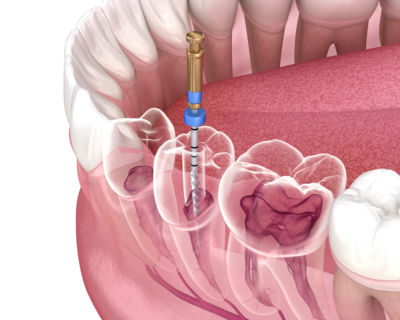Imagine this: you’re at the dentist’s office, and they mention the dreaded words, “You need a root canal.” Panic sets in, right? Well, you’re not alone. Root canals have a reputation for being scary and painful, but here, we’ll set the record straight. Let’s learn more about root canals in Greenville, NC, from what they are to why they’re needed, and how they’re not as scary as you might think.
 WHAT IS A ROOT CANAL?
WHAT IS A ROOT CANAL?
A root canal is a dental procedure that becomes necessary when the inner part of a tooth, known as the pulp, becomes infected or damaged. To understand this better, think of your tooth as a protective fortress.
Deep inside, there’s a sensitive nerve and blood vessels. Sometimes, harmful bacteria can breach this fortress, leading to painful infections and even the potential loss of the tooth.
In a root canal procedure, the dentist’s goal is to save your natural tooth. They achieve this by carefully removing the infected pulp, which includes the nerve and blood vessels, and then sealing the tooth
WHEN ARE ROOT CANALS NEEDED?
Your dentist may recommend a root canal when your tooth faces significant problems. Think of it as a crucial step to save your tooth. Here are situations that require immediate attention and may lead to the need for a root canal:
- Tooth Decay: A cavity, if left untreated, can penetrate deep into your tooth. If it reaches the inner part unchecked, it can cause an infection. Your dentist suggests a root canal to remove this threat and prevent further damage.
- Infection: Sometimes, your tooth can sustain deep cracks or chips, often due to injury. These cracks create openings for bacteria to enter, leading to a tooth infection. A root canal becomes necessary to repair the tooth and stop the infection from spreading.
- Severe Pain: When your toothache becomes persistent and intense, it indicates a serious issue inside the tooth. This type of pain usually means there’s an infection in the tooth’s core, prompting your dentist to recommend a root canal without delay.
- Abscess: Think of an abscess as a troubling presence near your tooth. It’s a pocket of pus, a clear sign of a significant problem that needs immediate attention. A root canal is the essential procedure to resolve the issue and restore the health of the affected area.
So, if your dentist tells you that your tooth is facing a substantial problem and a root canal is needed, understand that it’s their dedicated effort to ensure your tooth’s safety and health.
WHAT HAPPENS DURING A ROOT CANAL?
Understanding what happens during a root canal in Greenville, NC can significantly ease your anxiety. Let’s walk through the root canal procedure step by step:
- Diagnosis: It all starts with a careful examination by your dentist. They may take X-rays to get a clear picture of what’s happening inside your tooth. This helps them pinpoint the problem areas.
- Local Anesthesia: Before anything begins, your dentist ensures your comfort. They use local anesthesia to numb the area around the affected tooth. This step is crucial, as it means you won’t feel pain during the procedure.
- Cleaning and Shaping: With the tooth numb, your dentist creates a small opening in the tooth’s crown to access the infected pulp. They carefully remove the infected or damaged pulp, leaving the healthy parts intact. The tooth’s interior is then cleaned and shaped to prepare it for the next step.
- Sealing: Once the tooth is clean and shaped, your dentist seals it to prevent further infection. This involves filling the space inside the tooth with a biocompatible material, usually a rubber-like substance called gutta-percha. This seals off the inner chambers, ensuring no more bacteria can get in.
- Restoration: In many cases, a tooth that has undergone a root canal may need additional support. Your dentist might recommend placing a crown on the tooth to protect it and restore its strength. Crowns are custom-made to match your natural teeth and provide long-term protection.
It’s important to note that advances in dental technology have made root canals more precise and efficient. X-rays and other advanced tools allow your dentist to accurately diagnose and treat the problem, ensuring the best possible outcome.
So, when you’re facing a root canal, know that your dentist is skilled in the latest techniques and technologies, and they’re committed to ensuring your comfort throughout the procedure.
WHAT ABOUT AFTER THE ROOT CANAL?
After understanding what happens during the root canal procedure, it’s important to know what to expect afterward and how to ensure a smooth recovery. Here’s a quick overview:
- Mild Discomfort: It’s common to experience some mild discomfort or sensitivity in the treated tooth for a few days after the procedure. This discomfort is usually manageable with over-the-counter pain relievers and should gradually subside.
- Temporary Dietary Restrictions: Immediately after the root canal, it’s advisable to avoid chewing on the treated tooth until any discomfort has subsided. Stick to softer foods to minimize stress on the tooth. As your tooth heals, you can gradually reintroduce your regular diet.
The Role of Follow-Up Appointments
Follow-up appointments are essential in ensuring the root canal’s success. Your dentist will assess your healing progress, address any concerns, and may recommend additional treatments if needed.
These appointments provide an opportunity to confirm that the infection has been completely eliminated, and the tooth is healing as expected.
 DEBUNKING MYTHS AND ADDRESSING FEARS
DEBUNKING MYTHS AND ADDRESSING FEARS
Root canals in Greenville, NC, have garnered quite a few myths and fears over the years. We cannot be well-informed about them without addressing the most common misconceptions with well-explained facts. Let’s set the record straight:
Myth: Root Canals Are Excruciatingly Painful
- Fact: This is perhaps the most widespread myth about root canals. In reality, modern root canal procedures are virtually painless. Before starting the procedure, your dentist will administer local anesthesia to numb the area completely. You may feel some pressure or minor discomfort, but it’s far from the excruciating pain often associated with this myth.
Myth: Root Canals Cause Health Problems
- Fact: There is no scientific evidence linking root canals to health issues, such as heart disease or cancer. In fact, a properly performed root canal can actually help save your tooth and prevent the spread of infection, which could have broader health consequences.
Myth: Root Canals Are a Last Resort
- Fact: Root canals are not a procedure of last resort. They are a standard dental treatment aimed at saving your natural tooth. Dentists recommend root canals when there’s a chance to preserve your tooth and avoid extraction, which is often the more complex and costly alternative.
Myth: Root Canals Take Multiple Appointments
- Fact: While some complex cases might require more than one appointment, many root canals are completed in a single visit. Advances in dental technology and techniques have streamlined the process, making it more efficient.
Myth: Root Canals Are Risky
- Fact: Root canals are a routine and safe dental procedure when performed by a qualified dentist. The risk of complications is minimal, and the benefits of saving your natural tooth far outweigh any potential risks.
Myth: Root Canals Weaken Teeth
- Fact: Root canals do remove the infected pulp from the interior of the tooth, but the tooth itself is not weakened. In fact, most teeth that undergo root canals are restored with crowns, which strengthen and protect the tooth, allowing it to function normally.
ALTERNATIVE TREATMENTS AND CONSEQUENCES OF AVOIDING A ROOT CANAL
Consequences of Avoiding a Root Canal
Neglecting a root canal can lead to serious consequences. The infection within your tooth can spread to nearby areas, causing abscesses or even bone loss in the jaw.
Additionally, the pain and discomfort associated with an untreated infection can become unbearable, affecting your overall well-being and quality of life. Eventually, the damage may become so extensive that the only option left is tooth extraction.
Alternative Treatments
- Tooth Extraction: When a tooth is beyond repair due to infection or damage, extraction may be the only option. However, losing a tooth can lead to a range of issues, and replacing an extracted tooth is often more complex and costly than preserving it through a root canal.
- Dental Implants: While dental implants are an effective way to replace missing teeth, they come with their own set of considerations. The process involves surgery and may require several months to complete.
Advantages of Preserving Natural Teeth
While alternative treatments like tooth extraction and dental implants have their place, preserving your natural teeth through a root canal is often the best option for maintaining oral health, function, and appearance
Natural teeth provide superior function and aesthetics compared to artificial replacements. Besides, root canals help maintain the integrity of your dental arch, preventing adjacent teeth from shifting and causing misalignment.
 DO YOU WANT TO KNOW MORE ABOUT ROOT CANALS IN GREENVILLE, NC?
DO YOU WANT TO KNOW MORE ABOUT ROOT CANALS IN GREENVILLE, NC?
Root canals are a valuable means of preserving your natural teeth and relieving pain caused by infection or damage. They have come a long way in terms of comfort and effectiveness, with modern techniques and anesthesia making the procedure virtually painless.
If you have any concerns about your oral health or suspect you may need a root canal or other dental care, don’t hesitate to reach out to our team at Michels & Gauquie DDS PA. Our experienced and empathetic dentists are here to answer your questions, address your concerns, and provide the dental care you need.



